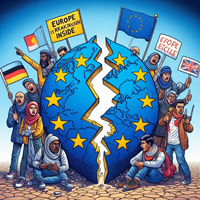By Ron Raskin

A few days ago, far-right parties made significant gains in the European Parliament elections, clearly indicating a seismic shift in EU public opinion on various policies, including migration.
Although EU immigration policy is already tightening, European citizens have shown their dissatisfaction with the current situation which seems to go far beyond border controls to limit immigration.
For many years, Europe has seen immigration as a solution to many different problems and in particular to a demographic problem that has an impact on health services for an aging population, but more importantly, it has many consequences related to the economy and consequently on Europe’s global standing and even on Europe’s stability. However, the failure to integrate immigrants has led to the collapse of this policy, contributing to the rise of far-right sentiment across Europe.
Both sides—those who believe in “living together” and those who think Europe is “losing its identity” —blame each other and resort to name-calling to highlight how wrong the opposing side is and, consequently, how right they are. However, instead of resorting to name-calling, it would be more productive to understand both perspectives.
Demography has long been a powerful tool in the struggle for status among groups and nations (see other battlefields here: https://elusive-world.com/modern-battlefield/ ). The Roman Empire leveraged it to expand, and the United States used it to grow and become a world superpower. Therefore, it was natural for Europe to follow a similar path by either welcoming new members into the European Union or easing migration policies to counteract the declining fertility rates across the continent.
This approach was expected not only to positively impact the European economy and overall European power but also to spread European values to other nations, thereby reducing global tensions. Additionally, it aimed to alleviate pressure on Europe’s borders from countries with high fertility rates (such as Arab states) where internal energy is high and potentially dangerous.
Europe did everything possible to ensure successful integration, including promoting a framework of social values like political correctness. Yet, this integration seems to be failing. Immigrants have not embraced European values and, instead of becoming vital contributors, are viewed by many Europeans as harmful to the society. When the integration of other groups or nations fails, the entire country becomes unstable, pressures increase, and the risk of explosive conflict threatens the nation’s existence. This is the inherent risk of a growth strategy: sometimes it succeeds and significantly strengthens the country, but when it fails or is unattainable, the outcome can be either a destabilizing collapse (as seen in Yugoslavia or Lebanon) or a gradual decline in global influence, requiring adaptation to a new status (as seen in Japan).
European citizens, who may be less concerned with abstract ideas of a “better future” but are very aware of current problems and tensions, are shifting to the right. As with any change, if this shift is managed in a controlled and rational manner, it has a chance of success. However, if driven by emotions and revolutionary fervor, it could empower extremists instead of pragmatists, potentially destabilizing the entire foundation of Europe and its democracy.
Hopefully, Europe will find a way to gradually alleviate pressure rather than waiting for a crisis to occur and then adapting accordingly. Democracy remains the most effective mechanism known for managing such pressures…

